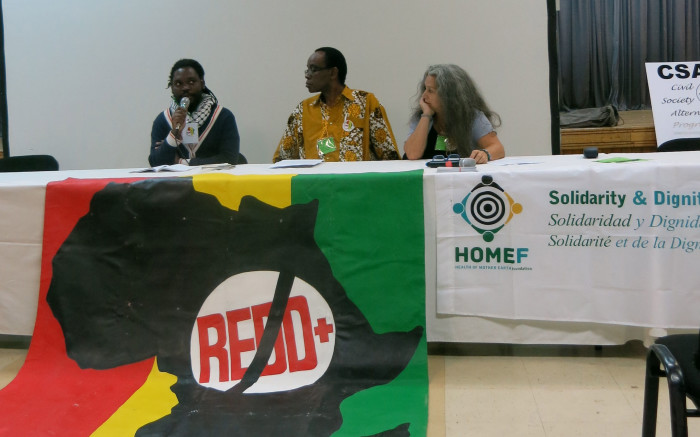Loggers and the United Nations want to grab African forests for REDD+, which promotes monoculture plantations and genetically modified trees and violates human rights, denounced the No REDD in Africa Network at the World Forestry Congress held in Durban, South Africa.

“Hands off Africa! Loggers go home! No REDD!” activists from the Civil Society Alternative Space chanted outside the World Forestry Congress. REDD+ (Reducing Emissions from Deforestation and forest Degradation) is a carbon offset mechanism that is a false solution to climate change and the pillar of the Green Economy, the privatization of Nature and the upcoming Paris Accord of the UN climate convention.
“All forms of REDD amount to two things: licensing polluters to keep polluting and grabbing lands and other resources from forest and peasant communities. REDD+ started as land grab, in Africa it is becoming a continent grab and if not checked it will turn into a planet grab,” Nnimmo Bassey, renowned Nigerian environmentalist and co-coordinator of the No REDD in Africa Network.
“Stop the disastrous REDD+ experiment!” demand the No REDD in Africa Network, the Global Alliance against REDD and over 65 organisations from all over the world, who signed the Durban Declaration on REDD.
REDD-type projects in Africa have resulted in violent evictions, threats to cultural survival, multi-generational carbon slavery and constitutes neocolonialism, according to the Worse REDD-type Projects in Africa, a compilation of the Network.
Anabela Lemos of Justiça Ambiental – Friends of the Earth Mozambique explains that “both the World Forestry Congress and the United Nations want to use REDD to grab Africa as a sponge for Northern industrialised countries pollution, instead of cutting emissions at source. Mozambique is already struggling with land-grabbing and human rights violations, REDD is going to exacerbate those problems and create more poverty. Already a third of Mozambique has been targeted for REDD.”
Ruth Nyambura, a political ecologist and eco-feminist from Kenya, has analyzed the official narrative to promote REDD. “REDD de-centers critiques of the extractivist economic policies, and weaves a narrative that not only allows the scape-goating of communities at the frontlines of the impacts of the climate crises, but also requires that they adapt and mitigate the effects of climate change using the same framework of markets, which caused the crises in the first place.”
